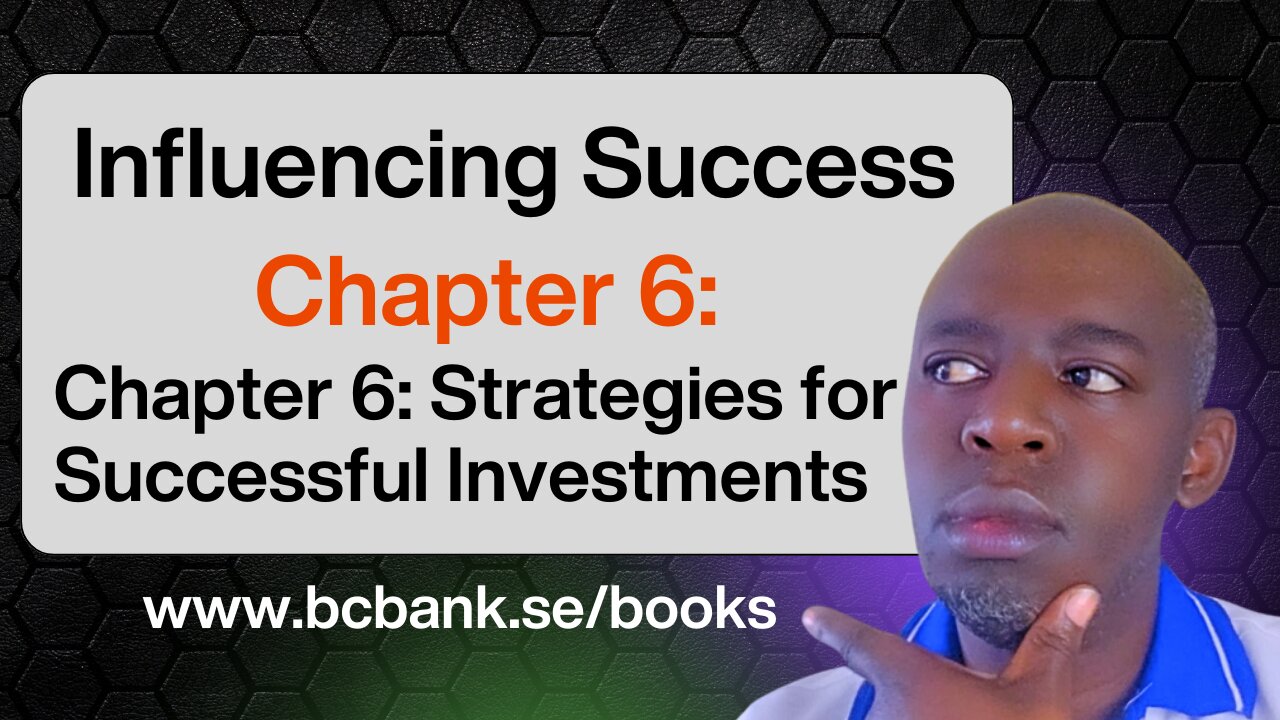Premium Only Content

Chapter 6 Strategies for Successful Investments | Influencing Success
Conducting Due Diligence
Book Available at https://bcbank.se
Conducting due diligence is a critical step in the process of cross-border investment, particularly for African multimillionaires and social media influencers looking to engage with global startups. This phase involves meticulously assessing the viability and risks associated with potential investments. It is essential to gather comprehensive information about the target company, its market position, and the regulatory environment in which it operates. By doing so, investors can make informed decisions that align with their financial goals and risk tolerance.
The first aspect of due diligence involves financial analysis. Investors should scrutinise the financial statements of the target startup, including balance sheets, income statements, and cash flow statements. Understanding the startup’s financial health provides insights into its sustainability and growth potential. Moreover, evaluating historical performance and forecasting future revenues can help identify any red flags that may indicate underlying issues.
In addition to financials, assessing the management team is paramount. The capabilities and experience of the startup’s leadership can significantly influence its trajectory. Investors should conduct interviews and background checks to gauge the team’s competence and vision. A strong, visionary leadership can be a decisive factor in the success of a startup, making it crucial for investors to understand the team's dynamics and track record.
Market analysis also plays a vital role in due diligence. Investors must investigate the competitive landscape and market trends relevant to the startup's industry. Understanding the market demand, potential customer base, and competitors will aid in evaluating the startup’s strategic positioning. An informed analysis of market conditions can help investors anticipate challenges and opportunities, thereby informing their investment strategies.
Lastly, legal due diligence is essential to ensure compliance with local laws and regulations. This includes reviewing contracts, intellectual property rights, and any pending litigation. A thorough legal assessment helps mitigate risks associated with regulatory non-compliance, which can have severe financial repercussions. By addressing these legal aspects, investors can protect their interests and ensure a smoother investment process.
Investment Diversification
Investment diversification is a critical strategy for mitigating risk and maximising returns, especially for African multi-millionaires and social media influencers engaged in cross-border investments. By spreading investments across various asset classes, sectors, and geographical regions, investors can protect themselves from market volatility and economic downturns. This approach not only enhances potential returns but also provides a buffer against the unpredictable nature of global markets.
In the realm of global startups, diversification becomes even more paramount. Investing in emerging markets can yield high returns, but these markets can also be subject to rapid changes and uncertainties. By diversifying their portfolios, investors can tap into different sectors within the startup ecosystem, such as technology, healthcare, and renewable energy. This strategy allows them to capitalise on growth opportunities while minimising the impact of underperforming investments.
Social media influencers play a significant role in shaping investment trends and can leverage their platforms to educate their followers about the importance of diversification. By sharing success stories and insights into their own investment strategies, these influencers can encourage their audiences to adopt a diversified approach. This not only enhances their credibility but also fosters a community that values informed financial decisions.
Furthermore, the interconnectedness of today’s global economy means that cross-border investments require a nuanced understanding of various markets. Diversification helps in navigating these complexities by providing exposure to different economic cycles and regulatory environments. Investors who embrace this strategy are better equipped to identify emerging trends and adapt to changing market dynamics, ensuring sustained growth in their portfolios.
In conclusion, investment diversification is not merely a safety net; it is a proactive strategy that empowers African multi-millionaires and social media influencers to thrive in the competitive landscape of cross-border investments and global startups. By embracing this approach, they can safeguard their wealth while exploring innovative opportunities that drive success in the ever-evolving market.
Exit Strategies for Cross-Border Investments
Exit strategies are crucial for investors seeking to optimise returns on cross-border investments. For affluent individuals and social media influencers in Africa, understanding the various mechanisms available for exiting investments can significantly enhance their financial portfolios. Whether through mergers, acquisitions, or initial public offerings (IPOs), each exit strategy offers unique benefits and challenges that must be carefully evaluated before proceeding.
One common exit strategy is the acquisition of a startup by a larger corporation. This approach allows investors to realise substantial gains while also providing the acquired company with resources to scale further. African multi-millionaires should actively seek partnerships with established firms globally to facilitate these acquisitions, leveraging their social media presence to create compelling narratives around the value of their investments.
Another viable exit strategy is the IPO, which can provide massive financial rewards but requires meticulous preparation. Having a solid business model, a robust market presence, and a clear growth trajectory are essential for convincing potential investors. Social media influencers can play a vital role in generating buzz and attracting attention to the IPO, utilising their platforms to communicate the brand's story and its potential.
Secondary sales in private equity markets also present an attractive option for exiting investments. By selling shares to other investors, African multi-millionaires can liquidate their holdings while maintaining some level of involvement in the company. This strategy not only provides immediate capital but can also enhance the company's credibility and market perception when managed effectively.
Finally, strategic divestments, where investors sell off parts of their portfolio to focus on more promising ventures, can be a pragmatic approach. Understanding market trends and consumer behaviour is essential for making informed decisions about what to divest. Social media can serve as a powerful tool for testing market reactions and gauging potential interest in divested assets, ensuring that these decisions are data-driven and strategically sound.
-
 8:33
8:33
Damon Imani
16 hours agoDamon OBLITERATES Everyone On The View For 8 Minutes Straight! | Compilation Vol.16
2792 -
 18:08
18:08
Actual Justice Warrior
20 hours agoMamdani CRIES Victim After Eric Adams Drops Out
2.43K15 -
 23:08
23:08
DeVory Darkins
1 day ago $10.62 earnedDemocrats STUNNED by Trump meeting as Omar EMBARRASSES after shocking statement
15.6K87 -
 2:17:10
2:17:10
qixso
13 hours ago $1.94 earnedBO7 ON THE WAY !
22.5K3 -
 2:07:47
2:07:47
Side Scrollers Podcast
19 hours agoHasan SCARED To Attend Twitch Con + EA Devs CRASH OUT Over Saudi Sale + More | Side Scrollers
27.6K4 -
 15:10
15:10
GritsGG
15 hours agoInsane Regain Dubular on Warzone Duos w/ Bobby Poff!
9.05K -
 2:48:00
2:48:00
BlabberingCollector
1 day agoReacting To Emma Watson / Jay Shetty Interview, Reading JKR Tweets!
10.1K5 -
 17:52
17:52
The Pascal Show
1 day ago $5.03 earned'PARENTS DON'T BELIEVE HE DID IT!' Candace Owens Says Tyler Robinson's Parents Don't Think He Did It
25.3K24 -
 1:46:23
1:46:23
The HotSeat
15 hours agoCommander In Chief and SECWAR Address The Troops, and I AM HERE FOR IT!
43.7K19 -
 2:07:00
2:07:00
The Michelle Moore Show
2 days ago'President Trump on Radicals, Susie Wiles In Question Again, Erika Kirk Evokes More Questions, Spiritual Calamity Coming For The President?' Guest, Mark Taylor: The Michelle Moore Show (Sept 29, 2025)
49.6K112